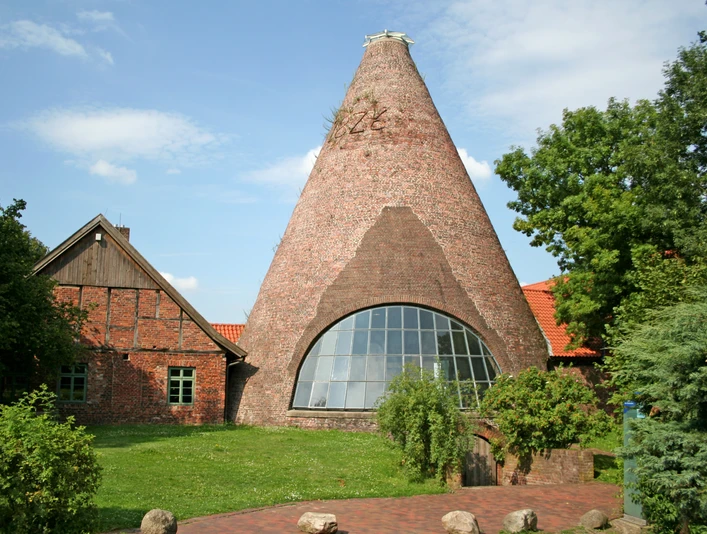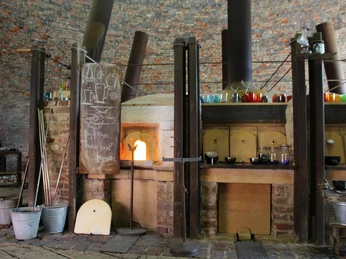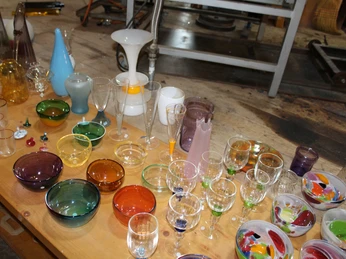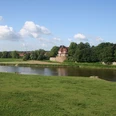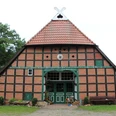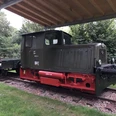Sand, soda and lime - the raw materials from which glass is made have remained the same to this day. Apart from that, a lot has changed in glass production over the last 700 years since the first forest glassworks were built on the banks of the Weser. In Petershagen, on the banks of the Weser, lies Gernheim - a factory site from the early 19th century.
A monumental cone tower on the steep banks of the Weser is a reminder of a 19th century glassworks that was one of the most important factories in north-west Germany for a time. As the site of the LWL Industrial Museum, the Gernheim glassworks primarily documents the living and working conditions during early industrialization. Visitors can watch glassmakers at work every day. The workers' houses, the former factory owner's villa, the administration, an inn, the basket weaving workshop with the factory school and Gernheim's landmark - the conical glassworks tower from 1826 - are still preserved today. The historic melting furnace has been reconstructed and equipped with new technology for show production. Glassmakers use the pipe to produce glasses and bottles from a red-hot mass, just as they did 100 years ago. A cutter and engraver finishes the glass once it has cooled. The pieces are sold in the museum store. The permanent exhibition presents the stages of glass production and provides information about the living and working conditions of the Gernheim workers and their families and offers a tour through the history of glass from 1800 to the present day. Exhibition: History, working life, packaging, transport & trade, glass history/stories, show production.
The manor house of the Gernheim glassworks was built in 1812 by the founder of the glassworks, Fritz Schrader. The owners of the glassworks lived there with their families until 1877. A few years ago, the rooms and garden were restored according to historical models, so that the former garden room, which was already used for social occasions in Schrader's time, now shines in new splendor.
UNESCO:
The manual production of hand-blown hollow and flat glass was added to the UNESCO Intangible Cultural Heritage List in 2015.
A monumental cone tower on the steep banks of the Weser is a reminder of a 19th century glassworks that was one of the most important factories in north-west Germany for a time. As the site of the LWL Industrial Museum, the Gernheim glassworks primarily documents the living and working conditions during early industrialization. Visitors can watch glassmakers at work every day. The workers' houses, the former factory owner's villa, the administration, an inn, the basket weaving workshop with the factory school and Gernheim's landmark - the conical glassworks tower from 1826 - are still preserved today. The historic melting furnace has been reconstructed and equipped with new technology for show production. Glassmakers use the pipe to produce glasses and bottles from a red-hot mass, just as they did 100 years ago. A cutter and engraver finishes the glass once it has cooled. The pieces are sold in the museum store. The permanent exhibition presents the stages of glass production and provides information about the living and working conditions of the Gernheim workers and their families and offers a tour through the history of glass from 1800 to the present day. Exhibition: History, working life, packaging, transport & trade, glass history/stories, show production.
The manor house of the Gernheim glassworks was built in 1812 by the founder of the glassworks, Fritz Schrader. The owners of the glassworks lived there with their families until 1877. A few years ago, the rooms and garden were restored according to historical models, so that the former garden room, which was already used for social occasions in Schrader's time, now shines in new splendor.
UNESCO:
The manual production of hand-blown hollow and flat glass was added to the UNESCO Intangible Cultural Heritage List in 2015.
Good to know
Openings
Dayoff: Monday
Price info
Adults: 4,00 €
Children, young people and school pupils: free admission
Reduced*: € 2.00
Groups of 16 persons or more € 3.50 per person
* Those entitled to a discount are recipients of current benefits in accordance with Social Security Codes II and XII, students up to the age of 30, trainees, volunteers and people with a degree of disability of 50%.
Children, young people and school pupils: free admission
Reduced*: € 2.00
Groups of 16 persons or more € 3.50 per person
* Those entitled to a discount are recipients of current benefits in accordance with Social Security Codes II and XII, students up to the age of 30, trainees, volunteers and people with a degree of disability of 50%.
Social Media
Author
Mittelweser-Touristik GmbH
Lange Straße 18
31582 Nienburg/Weser
Organization
Mittelweser-Touristik GmbH
License (master data)
Mittelweser-Touristik GmbH
Nearby
